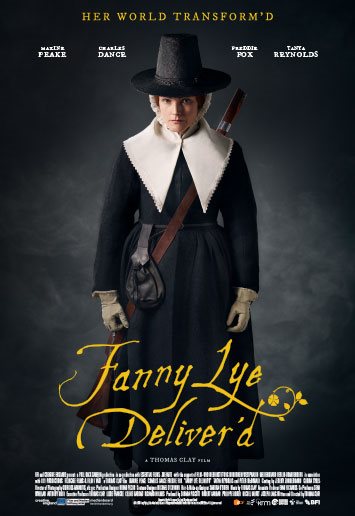
FANNY LYE DELIVER’D
UK, 2019, 122 minutes, Colour.
Maxine Peake, Charles Dance, Freddie Fox, Tanya Reynolds, Zak Adams, Peter McDonald, Kenneth Collard.
Directed by Thomas Clay.
While there was a 1970 film, Cromwell, with Richard Harris in the title role and Alec Guinness as Charles I, the Puritan period in English history, after the execution of Charles I until the restoration of Charles II, is a rather dour period, the subject of some films as this one.
The setting is 1657. Most of the action takes place on a country property and in the house and barn of the Lye family. The family is strictly Puritan in its lifestyle, churchgoing, prayer, scripture quoting, strict moral standards. The head of the family, patriarchal, is John, a veteran from Cromewll’s wars, especially in Ireland, and is played by Charles Dance. His wife, Fanny, a subdued wife of those times, devoted and faithful to her husband, really knowing no other way of life, is played by Maxine Peake. They have a son, Arthur, played by Zak Adams.
The film introduces a fleeing couple, naked, arriving at the house, settling in, confronted by the family, but the young man, Thomas, Freddie Fox, is deferential to John,, a long discussion about loyalties, and the couple being accepted into the household. The wife, Rebecca, Tanya Reynolds, supports her husband.
All seems to go well, but the newcomers mysterious. There is an episode where they play mischievously and John takes exception, summoning his son and beating him. Fanny, observes all that is going on, quietly.
The film is very strong one of dialogue, and could have been a play in the theatre.
The conflict emerges when the couple is presented as free-thinking, anti-Puritan stances, fleeing from authorities. When the sheriff arrives searching for them, Thomas takes the family hostage with a knife, and John has to send the authorities away. What follows then is a siege situation, Thomas in control, tying up the family, disabling John by wounding him. There are also the taunts about free-thinking and morality which John rejects. However, there is the seduction of Fanny, sexual behaviour from Rebecca, John observing, disgusted, Thomas leading them on.
The couple leave, John searches, and in return to the home, finds that the local authorities have attacked, and his son is dead.
Thomas is attacked, wounded. Rebecca then invites Fanny to leave and she does. Rebecca’s voice-over throughout the film now indicates that Fanny and Rebecca travelled the countryside, joined the Society of Friends, the Quakers, Fanny becoming a preacher, quite famous, deported by the authorities to Rhode Island.
The film dramatises the conflict between Puritan morality and Free Thinking at the time of the Parliament, in the context of post-Civil War England. And the dialogue and the drama raise the questions of belief and morality in the 21st-century.
Director, Thomas Clay is also a musical composer and at the end of this film there is his composition, March for Joy, based on Beethoven’s Ode to Joy.
- The glimpse of history? The Puritan era, in England, the influence? Crises, religious and moral?
- 1657, the English countryside, the vistas of the land, the homes, farms? The home and interiors? The barn? The musical score?
- The historical background, the execution of Charles I, the Parliament, Oliver Cromwell, the Republic? Strict moral values? Scripture quoting? Prayer? The restoration soon to come?
- The portrait of the Lye family, John, his background in the wars, siding with Cromwell, campaigns, injury? Strict, treatment of his wife, severity with his son, the straight and narrow, discipline, the beatings? Prayer at meals? Fanny, her accepting of the situation? Arthur, his age, respect for his father?
- Thomas and Rebecca, seen fleeing naked through the forest, going to the Lye house, the barn, clothes, the fire, Rebecca and her wounds? The mystery?
- The return from church, seeing the smoke, investigating the house, the barn, the encounter with Thomas? His age, explanation of himself, Rebecca? The discussions at the table with John, John’s proposal, Thomas accepting it, staying in the house, part of the household? Fanny going to the barn, Rebecca and her wounds, clothes? The lifestyle with the visitors?
- Thomas and Rebecca, the mysterious past? The gradual revelation of their stances, non-religious, criticisms of church, prayer, quoting the Scriptures? Anti-Puritanical? John and his reactions? Arthur playing the games bonding with Thomas, his father’s discipline, the beating?
- Fanny, the submissive wife of the times, the Puritan ethos, relationship with John, with Arthur?
- The arrival of the sheriff, the search for Thomas and Rebecca, Thomas with the knife, holding the family hostage, John and his urging the visitors to leave?
- John, the reaction to Thomas, the threats, the sword, Thomas hitting John, tying up the family? Rebecca and her reactions?
- The gradual revelation of their freethinking, non-religious, non-moral? Rebecca naked? Fanny, averting Arthur’s eyes? John and his reactions? The Eucharistic ceremony, communion, John turning away? Thomas pouring the wine over his head?
- John, Thomas hitting his leg, lame, forced to carry the bucket, get the water?
- The sexual sequences, the seduction of Fanny, with Rebecca, John and his reaction? Thomas and his advances, the impact on Fanny? Thomas retreating, not imposing himself on any woman?
- The couple escaping, the return? The pursuit by John? The visitors coming again, the death of Arthur, the effect on John?
- The struggle with Thomas, his death? Fanny, decisions, taunted by Thomas, led on by Rebecca, leaving, her dead son, leaving John and puritanical way of life?
- The final information, Rebecca’s voice-over throughout, Fanny and her leaving, religious, joining the Quakers, her being a leader, preacher, arrested and transported to Rhode Island?
- The historical perspective on the contrast between the Puritan ethos and freethinking? The 21st-century relevance to these issues?